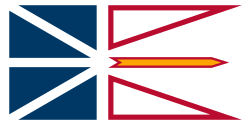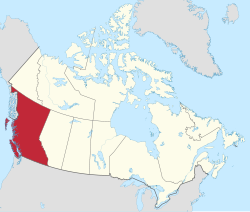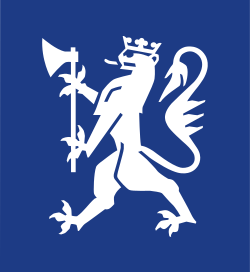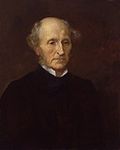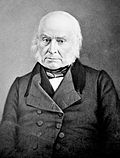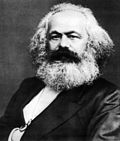Portal:Politics
| Main | Topics and categories | Tasks and projects |
The Politics portal

Politics (from Ancient Greek πολιτικά (politiká) 'affairs of the cities') is the set of activities that are associated with making decisions in groups, or other forms of power relations among individuals, such as the distribution of status or resources. The branch of social science that studies politics and government is referred to as political science.
Politics may be used positively in the context of a "political solution" which is compromising and non-violent, or descriptively as "the art or science of government", but the word often also carries a negative connotation. The concept has been defined in various ways, and different approaches have fundamentally differing views on whether it should be used extensively or in a limited way, empirically or normatively, and on whether conflict or co-operation is more essential to it.
A variety of methods are deployed in politics, which include promoting one's own political views among people, negotiation with other political subjects, making laws, and exercising internal and external force, including warfare against adversaries. Politics is exercised on a wide range of social levels, from clans and tribes of traditional societies, through modern local governments, companies and institutions up to sovereign states, to the international level.
In modern states, people often form political parties to represent their ideas. Members of a party often agree to take the same position on many issues and agree to support the same changes to law and the same leaders. An election is usually a competition between different parties.
A political system is a framework which defines acceptable political methods within a society. The history of political thought can be traced back to early antiquity, with seminal works such as Plato's Republic, Aristotle's Politics, Confucius's political manuscripts and Chanakya's Arthashastra. (Full article...)
Selected article
The privilege of peerage is the body of special privileges belonging to members of the British peerage. It is distinct from Parliamentary privilege, which applies to those peers serving in the House of Lords, and members of the House of Commons, during and forty days before and after a Parliamentary session. The privileges have been lost and eroded over time. Only three survived into the 20th century: the right to be tried by other peers of the realm instead of juries of commoners, freedom from arrest in civil (but not criminal) cases, and access to the Sovereign to advise him or her on matters of state. The right to be tried by other peers was abolished in 1948. Legal opinion considers the right of freedom from arrest as obsolete. The remaining privilege was recommended for formal abolition in 1999, and may be retained, arguably, by peers whether members of the House of Lords or not. Peers have other rights that do not formally comprise the privilege of peerage. For example, they are entitled to use coronets and supporters on their achievements of arms.
Featured picture

Andrew Gregg Curtin (1817–1894) was a U.S. lawyer and politician. He served as the 15th Governor of Pennsylvania during the American Civil War. During the Civil War, Curtin organized the Pennsylvania reserves into combat units, and oversaw the construction of the first Union military camp for training militia. After the Battle of Gettysburg, Governor Curtin was the principal force behind the establishment of the National Cemetery there. After serving two terms as governor, Curtin was appointed ambassador to Russia by Ulysses S. Grant, and he later served in the House of Representatives from 1881 until 1887.
Selected quote
Selected biography
Nikita Khrushchev (1894–1971) led the Soviet Union during the Cold War. He served as First Secretary of the Communist Party of the Soviet Union from 1953 to 1964, and as Chairman of the Council of Ministers, or Premier, from 1958 to 1964. Khrushchev was responsible for the partial de-Stalinization of the Soviet Union, for backing the progress of the world's early space program, and for several relatively liberal reforms in areas of domestic policy. Khrushchev was born in the Russian village of Kalinovka in 1894. With the help of Lazar Kaganovich, he worked his way up the Soviet hierarchy. He supported Stalin's purges, and approved thousands of arrests. Stalin's political heirs fought for power after his death in 1953, a struggle in which Khrushchev, after several years, emerged triumphant. On February 25, 1956, at the Twentieth Party Congress, he delivered the "Secret Speech", vilifying Stalin and ushering in a less repressive era in the Soviet Union. Hoping eventually to rely on missiles for national defense, Khrushchev ordered major cuts in conventional forces. Despite the cuts, Khrushchev's rule saw the tensest years of the Cold War, culminating in the Cuban Missile Crisis.
Did you know (auto-generated) -

- ... that the Chinese government began compiling an official history of the Qing dynasty in 2002, but as of 2023 a protracted political review is forestalling its publication?
- ... that upon winning a civil war in Portuguese Timor, the political party Fretilin repeatedly requested that Portuguese authorities return?
- ... that a co-founder of Braver Angels designed their Red/Blue political depolarization workshops based on couples therapy?
- ... that Nobel laureate Thomas Mann reportedly did not want his Reflections of a Nonpolitical Man to be translated into English during his lifetime due to its chauvinistic content?
- ... that Checheyigen's political acumen ensured that her family became one of the most powerful in the Mongol Empire?
- ... that a priest refused to perform the wedding ceremony for Austrian socialist Josef Peskoller and his fiancée Maria Griel on political grounds in 1928?
More did you know...
- ...that the Almanach de Gotha is a directory of European nobility first published in 1763?
- ...that Nazi scientists claimed to have trained a dog to call "Adolf Hitler" as "Mein Führer"?
- ...that for many years, the Russian Soviet Republic did not have its Communist Party?
- ...that the World War II idea of Polish-Czechoslovakian confederation was eventually discarded by the Czechs, whose leader chose instead to believe in the Soviet Union promises of alliance?
- ...that just before the invasion of Poland, members of the German minority from Deutscher Volksverband were trained in sabotage by the Abwehr agents arriving in Poland from Germany?
- ...that the controversial Iraq De-Ba'athification policy banned anyone affiliated with the Ba'ath Party from working in the public sector?
In this month
- June 28, 2004 - Canadian federal elections occur; the Liberal party loses its absolute majority.
News and Current events
- August 11: 4 local government areas in New South Wales, Australia locked down after COVID-19 case
- August 11: Australia: AstraZeneca vaccine access expanded by Victorian government
- August 1: Australia: Victorian lockdown lifted
- July 29: Tunisia's president dismisses prime minister, suspends parliament
- July 25: Australia: Wikinews interviews Reg Kidd, mayor of the City of Orange, about COVID-19 lockdown and local government
- July 23: South Australia enters week-long lockdown to contain COVID-19 Delta variant spread
- July 21: Technological University Dublin senior lecturer Dr Lorcan Sirr speaks to Wikinews on housing market in Ireland
- July 21: Three rural councils in New South Wales, Australia enter 7-day lockdown
- July 21: Australia: Victoria lockdown extended by a week with 85 active cases recorded
- July 15: California governor signs new state budget, eligible Californians to get stimulus payments
Topics and categories
General images
Related portals
Associated Wikimedia
The following Wikimedia Foundation sister projects provide more on this subject:
-
Commons
Free media repository -
Wikibooks
Free textbooks and manuals -
Wikidata
Free knowledge base -
Wikinews
Free-content news -
Wikiquote
Collection of quotations -
Wikisource
Free-content library -
Wikiversity
Free learning tools -
Wiktionary
Dictionary and thesaurus




